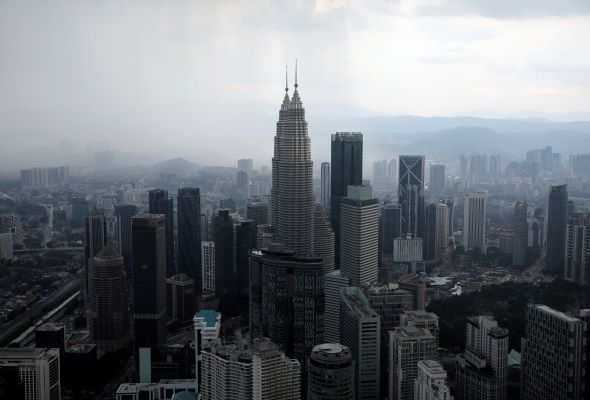
Published in Astro Awani & Focus Malaysia, image by Astro Awani.
Forget growth and development if governance issues are not taken care of.
As far as mere mentioning (mostly) the right things, the Twelfth Malaysia Plan (12MP) is a step in the right direction. However, prerequisites to successful policy implementation include sufficient supply of skilled human resources, sustainable funds, and good governance.
Unfortunately, we have problems on all three fronts due to persisting structural, economic, and political issues.
In that regard, the 12MP generally recognises all the right things that need to be addressed to achieve its visions. However, the combination of a short timeframe to achieve the various ambitious wish lists in the backdrop of the said limitations begs the question of practicality and realism.
Afterall, a company with frequent management changes with critical shortages of capable man-power and tight finances must be laser-focused in its objectives and carefully prioritise its business.
Taking this analogy, if Malaysia has to focus on one item, immediate and radical reformations on good governance can start to pave the way in ensuring the right people (rare individuals with the right type and level of skillsets in a country with serious brain drain issue) are in the right places and that limited (mostly borrowed) funds are managed properly.
After that, everything else can start to fall into place.
The 12MP and its predecessors have mentioned about addressing good governance through crucial reforms, but the seriousness and presence of political will in addressing this are severely in question.
Issues such as fighting corruption, structural reforms to ensure separation of powers for proper rule of law, and other cancers of governance bred from cronyism, cartels, syndicates, and divisive/disruptive ethno-centric patronage politics run contrary to true inclusiveness and prosperity as envisioned in the 12MP.
These governance loopholes have persisted and capitalised upon over many decades, contributing to the failure of past plans and arguably causing the inability to overcome all challenges to become a “fully developed” nation as previously envisioned under Vision 2020.
As outlined in 12MP, some of these challenges include the establishment of a united nation with a sense of common and shared destiny, a fully moral and ethical society, a scientific and progressive society, an economically just society, and a prosperous society with an economy that is fully competitive, dynamic, robust and resilient.
Without immediately addressing the root causes of these challenges, the concept of Keluarga Malaysia remains a fantasy.
The same issues that have failed us in achieving Vision 2020 over 30 years will not be the same reasons that would allow us to achieve Shared Prosperity Vision 2030 in under a decade.
The relationship between good governance and economic prosperity is firmly established in various anecdotal and empirical research.
For example, researchers from Tennessee State University published a study in the Journal of Social and Economic Development on the impact of governance on economic growth in developing countries. They found that two governance indicators namely Rule of Law and Control of Corruption have positive impacts, and that these are “paramount importance to drive economic growth” for developing nations.
Liu and colleagues (2018) investigated the impact of governance quality on economic growth in China (which has seen a rapid economic growth and development) and found that high governance quality and human capital has a positive effect on economic growth, amongst other findings.
Despite this, good governance and reforms are not listed as policy enablers of the 12MP, but rather as “game changers”. If anything, successfully addressing these issues should be a prerequisite of further policy implementations, measured with well-defined and realistic key performance indicators.
Experts have mentioned that the entire RM400 billion estimated for 12MP development expenditure may have to be borrowed. As with any borrowed funds, the most important thing is to ensure it is spent prudently and efficiently. As the burden of increased debt is left to be dealt with by future generations, ensuring the money goes to growth and development is paramount.
Unfortunately, despite the high stakes and critical situation the country is in, the situation now is a pervasive corruption culture amongst civil servants engaged in cartels of all kinds.
Law enforcement officers are said to be in cahoots with syndicates. And politicians conspire with business elites with shady backgrounds involving questionable off-shore accounts – all made worse with what appears to be a “pay to get away” scheme available for these elite individuals.
This is encouragement of poor governance, not reforms.
This entrenched, interconnected, well-oiled, dirty, self-enforcing machinery is a stumbling block to growth and development. It is set to put Malaysia into a failed state and there is not enough political willpower to stop it.
The cure for the cancer of corruption are ultimately morals and principles, but instilling this will take some time, if ever.
In the near term, the “vaccine” for the pandemic of poor governance is radical transparency (a component of good governance) and radical reforms can only be possible with significant political will.
This is the step-by-step formula that has been recalcitrant in taking shape. So how can Malaysia reset the economy (one of the main themes of 12MP), without immediately addressing crucial and necessary reforms?
The 12MP mentions “overcome shortcomings in development approach, governance and implementation” as a game changer under reforms and transformations. Again, it has all the buzzwords that many have been calling for, but how serious is it?
Under the “How will this be achieved?” section of Game Changer 1: Imperatives for Reform and Transformation, “Strengthening governance ecosystem” has been listed as one of the elements, which is akin to a circular reference error in Microsoft Excel.
Of course, it is acknowledged that the document is not meant to provide detailed implementation and operational contexts, but it needs more granularity. More importantly, although words are just words, they should at least imply actual commitment to specific plans, rather than mere targets or objectives that have been repeated before.
As mentioned in the 12MP document itself, the National Transformation Policy (NTP) introduced a number of transformation programmes targeting improvements in specific areas such as governance, the economy and politics.
The NTP which operated from the year 2011 to 2020 had nearly a decade to achieve this, and we can safely say the specific areas targeted have largely degraded due to the same issues mentioned.
That said, the 12MP does put some emphasis which hinted at commitments on upholding integrity and eradication of corruption in public service. It is said that all government agencies will implement the Organisational Anti-Corruption Plan as outlined under the National Anti-Corruption Plan (NACP) to address governance, integrity and corruption issues within each organisation.
It is also said that the Malaysian Anti-Corruption Commission Act 2009 will be enforced and enhanced, with strategic partnerships between civil society organisations and political parties to be undertaken to strengthen the fight against corruption.
Time will tell what words such as “enhanced”, “enforced”, “strengthened” “encouraged” and “partnerships” actually entails when/if these are implemented.
It matters not what is written in the 12MP if the Minister-in-charge or political appointees in the agencies and the (overlooked and underestimated) civil servants in charge of policy implementation have their own agendas to protect their own interests.
These could be maintaining power through identity politics, accumulation of wealth through cartels, or policy implementation and practices through racial prejudices in what is supposed to be a fair execution of national policy of all members in said “Keluarga”.
Poor governance is one of the main reasons why Malaysia always falls short in implementation, despite fancy and well-thought-of national plans. Unjust policies and poor governance lead to unfair markets and discrimination which also shuns away investors and new market players, increases wealth disparity, promotes disunity, reduces innovation and aggravates leakage of limited funds.
Action speaks louder than words.
This is a problem that has brewed over many decades and it wouldn’t go away just because some consultants have updated national policy documents with the latest words and trends.
It is time for affirmative reforms towards good governance, just policies, structures and legislations.
Ameen Kamal is the Head of Science & Technology at EMIR Research, an independent think tank focused on strategic policy recommendations based on rigorous research

